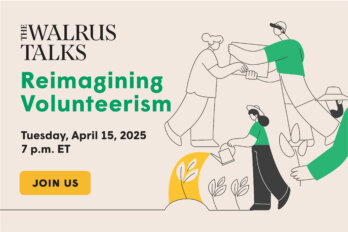Zeynep Arsel spoke at The Walrus Talks at Home: Living Better, which took place on March 15, 2021
You can watch all The Walrus Talks speakers from this event here: The Walrus Talks at Home: Living Better
Hi. My name is Zeynep Arsel. I am an Associate Professor of Marketing at Concordia University.
I am going to talk about Morality and Living better, but together
How do we navigate the moral choices we make in everyday life? How do we interact with others, and the material world around us as moral actors? Whether we are aware of this or not, many of our actions, big or small, have a moral dimensions, and this includes things we buy and consume.
Think about how much you decide to tip, which car you choose to drive, or whether you drive a car at all, how you feel about getting a haircut during a pandemic, or eating indoors at restaurants. These are moralized decisions. More, think about how you think of others when they make these choices. How many of us judged our friends’ on social media for posting photos of themselves doing things that we do not approve of? The year of 2020 was also the year of many unfollows and unfriendings.
My colleague Aya Aboelenien and I have been working on a series of projects that inquire about this. We are interested in how morality intersects everyday life, particularly marketplace and consumption.
We find that the story of morality and markets is a long and rich one with frequent plot twists and never-ending contestations. What is considered moral is a product of cultural processes. We unpack these processes and see that these are complex negotiations that involve legal, religious, political, medical or educational systems.
We can see this in the prohibition of alcohol and eventual legalization and legitimization of it in Canada. Similarly, think about how the society has challenged their beliefs about cigarettes as medical authorities revised their understanding. Same goes for single use plastics as morally complex objects as we are reconsidering our ecological impact on earth. How many of you feel bad about using plastic bags? How many of you did 10 years ago?
For a more recent example, think what we feel about masks, compared to just a year ago. How we have shifted the ways we think about masks and how institutions such as legal and medical authorities shaped these thoughts and feelings is a moral matter. This small, seemingly insignificant object, has become a focus of cultural, political, and interpersonal tensions. Morality is about social consensus on these judgments, but also usually the lack of consensus.
When we talk about morality in the marketplace, we can see it at different levels. At the most abstract level moral tensions shape the society, even intersecting legal frameworks such as mandatory mask requirements or legalization of cannabis.
But morality also affects how we live with others as social beings and how we relate to our friends and families. Aya and I study this in the context of veganism, and how what we feel about consuming animals shapes our interpersonal relations. Who gets to be invited to a holiday dinner, and what is placed on the dinner table is more about morality than we can actually imagine. A family member not eating the centerpiece can upset a host, but so as the guest who might feel pressured to eat animals in a holiday setting. Conflicting moral positions can cause fractures in interpersonal relations including those with very close family members.
Morality is about judgement and the choices shaped by these judgements. What we think of as choices about personal, aesthetic or lifestyle matters frequently have moral foundations. This can be the size of our home, the coffee we drink, the meal we eat, or our clothes.
We cannot escape the ways morality enters into our everyday lives. We have to live with the weight of the everyday negotiations we have to make between being moral citizens and having a meaningful and pleasurable life.
But seeing ourselves as entangled actors in a network of moral relationships and processes could also help us to make better choices, not only for ourselves, but also the society we live in as well as the earth, our non-human companions, and anybody we share it with. It can help us to check back on our strong reactions to others’ choices, it can help us find more meaningful ways to manage moral tensions. It also can help us to better understand our position in our society and how our seemingly small choices (eating out in a restaurant for example) have impact for others. What seems personal is always relational.
Socrates had set the foundations of moral philosophy that still remains relevant: that we need to examine our lives continuously, to set not only the best lives for ourselves, but also for others. We, as moral citizens, have to consciously navigate this everyday, for living better.





